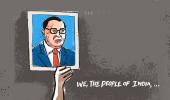On the 134th birth anniversary of the chief architect of the Indian Constitution, Utkarsh Mishra revisits three incidents from Dr B R Ambedkar's life that lay bare the deeply entrenched nature of caste prejudice.

Bhimrao Ramji Ambedkar was born on April 14, 1891, at Mhow cantonment in the Central Provinces (now Ambedkar Nagar in Madhya Pradesh), as the fourteenth child of Subedar Major Ramji Sakpal and Bhimabai. Though originally from Dapoli in Ratnagiri, the family was stationed in Mhow due to his father's army posting.
Dr Ambedkar's forefathers, in his words, 'had left their hereditary occupation for service in the army from the very commencement of the rule of the East India Company.'
After his father's retirement in 1894, the family relocated first to Dapoli and then to Satara. Two years later, while Bhimrao -- affectionately called Bhiva -- was attending Camp School in Satara, his mother passed away.
By 1900, he was enrolled at the Government High School in Satara, where his surname was changed to Ambedkar. In 1904, his family moved to Bombay (now Mumbai), setting the stage for his academic journey.
Dr Ambedkar's educational achievements were extraordinary for his time, especially for someone from the oppressed classes. He completed his matriculation in 1907 and was felicitated in a public ceremony. He joined Elphinstone College in Bombay in 1908 and completed his BA in Persian and English in 1913. A scholarship from Baroda State allowed him to study abroad, and in 1913, he joined Columbia University in New York.
Over the next decade, Dr Ambedkar completed his MA, PhD, and DSc, and studied law at Gray's Inn and economics at the London School of Economics.
After his Baroda State scholarship ended, Dr Ambedkar first returned to India in August 1917. He briefly worked in the Baroda State Service and later taught at Sydenham College in Bombay. However, due to continued caste-based discrimination and his academic aspirations, he went back to London in September 1920 to complete his studies. He earned an MSc in economics from the London School of Economics in 1921 and later submitted his doctoral thesis.
In April 1923, he returned to India after successfully completing his thesis, and dedicated his life to the upliftment of the oppressed classes.
In 1924, he founded the Bahishkrut Hitkarini Sabha to work for their welfare. He led various movements, including the landmark Chowdar Tank Satyagraha in 1927, where he and thousands of Dalits asserted their right to drink water from a public tank in Mahad. In 1937, he won the legal case affirming this right.
Despite his exemplary education and distinguished roles as a professor and lawyer, Dr Ambedkar continued to face systemic discrimination for being an 'untouchable'.
Around 1935-1936, he wrote a brief but powerful account of these experiences, which was later published as a collection titled Waiting for a Visa.
The book recounts several infuriating episodes that lay bare the deeply entrenched nature of caste prejudice -- incidents that make one question how a social belief could so thoroughly strip people of their humanity.
What's even more remarkable is that, despite being denied basic human dignity in such degrading ways, Dr Ambedkar did not turn to anger or vengeance. Instead, he chose the path of reform, dedicating his life to social justice and constitutional change in the hope of eradicating this centuries-old injustice.
Following are three incidents from Waiting for a Visa, that offer a stark glimpse into the kind of everyday humiliations Dr Ambedkar and others from the so-called 'untouchable' castes were subjected to.
First conscious realisation of being an 'untouchable'
Dr Ambedkar's first conscious brush with the reality of being an 'untouchable' came when he was just nine years old.
Before this incident, he recalls being aware of his caste identity -- he knew he was an untouchable, and that untouchables were subjected to certain indignities. For instance, at school, he had to sit separately from the other students on a gunny sack that he brought from home, and he wasn't allowed to drink water unless the peon opened the tap for him -- he was not permitted to touch it himself.
Yet, about this one journey, he writes that it gave him 'a shock such as I never received before'.
The incident occurred in 1901, when young Bhimrao, his elder brother, and two nephews set out from Satara to Koregaon, where his father worked as a cashier, to spend their summer vacation.
The children, dressed in new clothes for the journey, looked respectable. 'From our dress or talk, no one could make out that we were children of the untouchables,' Dr Ambedkar writes.
However, when they reached Masur station, they could not find their father or anyone sent by him to receive them. When no one turned to pick them up, the station master initially sympathised with their situation, assuming from their appearance and speech that they were upper caste children.
But upon learning they were Mahars -- deemed 'untouchables' -- his demeanour changed abruptly. He withdrew, visibly repulsed, and although he later helped them negotiate a bullock-cart ride, none of the cartmen would agree to transport them due to their caste.
Eventually, one cartman relented on the condition that the children themselves would drive the cart while he walked alongside. Their ordeal didn't end there.
Along the journey, they faced hunger, dehydration, and deepening fear as night fell.
However, they were denied access to clean water because of their caste, and were forced to abandon their meal midway for the lack of it. They ended up sleeping hungry in the cart.
The journey that should have been a simple visit became a traumatic reminder of their social status, leaving the young Ambedkar painfully aware that basic human necessities -- water, shelter, dignity -- could be withheld purely on account of caste.
Unable to find a house despite being in state service
Although the previous incident had made a young Ambedkar more aware of his caste identity than ever before, his five years spent studying in the West had made him unaccustomed to the social stigma of untouchability.
However, the harsh reality came rushing back when he returned to India in 1917.
As his higher education in the United States and the United Kingdom was sponsored by the maharaja of Baroda, he was obligated to serve Baroda state and accordingly reported for government duty.
Upon arrival, he struggled to find accommodation. Denied entry into Hindu establishments and unsure whether his friends would welcome him, he eventually sought refuge in a Parsi inn under the pretence of being a Parsi himself. Though initially accepted, he lived in isolation -- treated coldly even by the caretaker, surrounded by darkness and bats, and entirely deprived of social contact.
After eleven days, a group of angry Parsis, armed with sticks, confronted him for impersonating one of their own and accused him of polluting their community space. Though he pleaded to stay for a few more days, they issued an ultimatum: Vacate by evening or face the consequences.
Deeply shaken and heartbroken, Ambedkar turned to acquaintances for help -- first a Hindu friend who subtly discouraged him, then a Christian friend who diplomatically deferred responsibility to his orthodox wife.
Realising he had nowhere else to go, Dr Ambedkar spent five hours in a public garden before quietly collecting his belongings and returning to Bombay. The episode left a deep emotional scar; even after 18 years, he could recall the confrontation vividly -- and never without tears in his eyes.
For the first time, he realised that untouchability was not limited to Hindu society -- it was a social curse recognised and perpetuated across communities.
Accused of 'polluting' the water, again
Nearly two decades after the traumatic episode at the Parsi inn in Baroda, Dr Ambedkar encountered a strikingly similar experience -- this time in the princely state of Hyderabad.
In 1934, while on a sightseeing tour with fellow members of the oppressed classes, he planned a visit to the historic Buddhist caves at Verul. En route, the group decided to explore the ancient fort of Daulatabad. To avoid the challenges untouchables often faced while travelling, they kept the tour discreet, informing only trusted contacts in select locations.
Upon reaching Daulatabad, weary from travel, some members of the group washed themselves with water from a public tank near the fort's entrance.
Unknowingly, they had violated a local social taboo. Almost immediately, an enraged Muslim elder raised an outcry, accusing the group -- referred to derogatorily as 'Dheds' -- of polluting the tank. A hostile crowd quickly gathered, hurling abuses and threatening violence.
Despite Dr Ambedkar's attempts to explain their ignorance of the custom, the crowd turned its anger toward the local untouchables for not warning the visitors. When one Muslim insisted that untouchables must conform to religious customs, Dr Ambedkar sharply questioned whether their religion would still deny water access to an untouchable who converted to Islam.
The silence that followed revealed the moral weight of his challenge. Though the group was finally granted entry to the fort, an armed guard was assigned to ensure they didn't touch any water inside.
Reflecting on the episode, Ambedkar wrote that just as an untouchable was unacceptable to a Hindu or a Parsi, so too was he untouchable to a Muslim -- underscoring that caste-based prejudice cut across religious boundaries.











 © 2025
© 2025